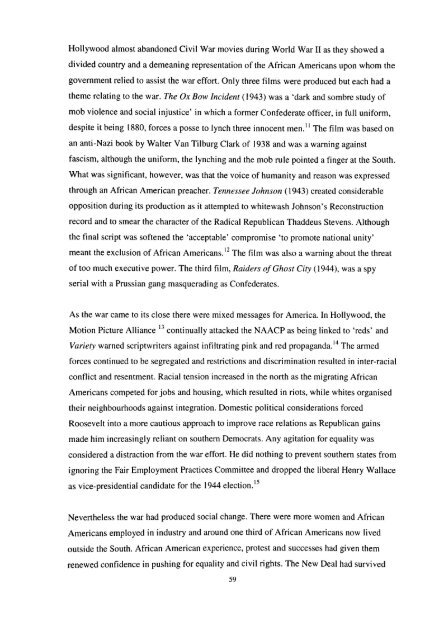Download (3483kB) - Greenwich Academic Literature Archive ...
Download (3483kB) - Greenwich Academic Literature Archive ...
Download (3483kB) - Greenwich Academic Literature Archive ...
- No tags were found...
You also want an ePaper? Increase the reach of your titles
YUMPU automatically turns print PDFs into web optimized ePapers that Google loves.
Hollywood almost abandoned Civil War movies during World War II as they showed adivided country and a demeaning representation of the African Americans upon whom thegovernment relied to assist the war effort. Only three films were produced but each had atheme relating to the war. The Ox Bow Incident (1943) was a 'dark and sombre study ofmob violence and social injustice' in which a former Confederate officer, in full uniform,despite it being 1880, forces a posse to lynch three innocent men. 11 The film was based onan anti-Nazi book by Walter Van Tilburg Clark of 1938 and was a warning againstfascism, although the uniform, the lynching and the mob rule pointed a finger at the South.What was significant, however, was that the voice of humanity and reason was expressedthrough an African American preacher. Tennessee Johnson (1943) created considerableopposition during its production as it attempted to whitewash Johnson's Reconstructionrecord and to smear the character of the Radical Republican Thaddeus Stevens. Althoughthe final script was softened the 'acceptable' compromise 'to promote national unity'meant the exclusion of African Americans. 12 The film was also a warning about the threatof too much executive power. The third film, Raiders of Ghost City (1944), was a spyserial with a Prussian gang masquerading as Confederates.As the war came to its close there were mixed messages for America. In Hollywood, theMotion Picture Alliance 13 continually attacked the NAACP as being linked to 'reds' andVariety warned scriptwriters against infiltrating pink and red propaganda. 14 The armedforces continued to be segregated and restrictions and discrimination resulted in inter-racialconflict and resentment. Racial tension increased in the north as the migrating AfricanAmericans competed for jobs and housing, which resulted in riots, while whites organisedtheir neighbourhoods against integration. Domestic political considerations forcedRoosevelt into a more cautious approach to improve race relations as Republican gainsmade him increasingly reliant on southern Democrats. Any agitation for equality wasconsidered a distraction from the war effort. He did nothing to prevent southern states fromignoring the Fair Employment Practices Committee and dropped the liberal Henry Wallaceas vice-presidential candidate for the 1944 election. 15Nevertheless the war had produced social change. There were more women and AfricanAmericans employed in industry and around one third of African Americans now livedoutside the South. African American experience, protest and successes had given themrenewed confidence in pushing for equality and civil rights. The New Deal had survived59
















